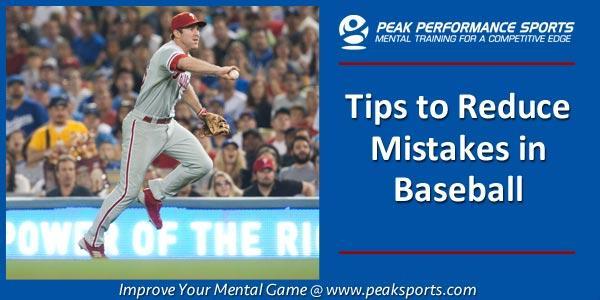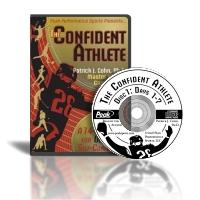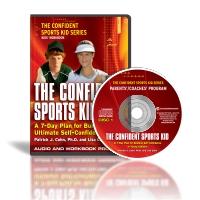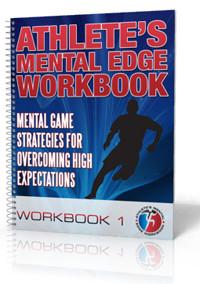
Focus In Critical Moments Of The Game
Have you ever lost your focus during a critical moment in competition and it led to a mistake?
Have you ever wondered exactly what caused that mistake? Was it a physical or mental mistake?
You may attribute mistakes to anxiety. While anxiety can disrupt your focus, there is more to it than just anxiety.
The best way to manage mistakes is to know the process by which they occur…
I interviewed Dr. Tom Hanson in regards to the factors leading to performance errors.
Dr. Tom Hanson is a mental coach and a sport psychology expert.
Hanson wrote the book, “Play Big: Mental Toughness Secrets That Take Baseball Players to the Next Level” and co-authored the popular baseball book, “Heads Up Baseball: Playing the Game One Pitch at a Time.”
In the interview, Hanson discussed his pyramid model for athletic performance.
HANSON: “I have a pyramid divided into five layers; it’s the performance pyramid for me. At the very tip of the top, is performance (what actually happens).
Then the layer just below that is physical, (what did you physically do).
My one example is a guy makes an error at third base… There’s a ground ball that comes to him at third and he lets it go through his legs. So the result is an error [performance]. Next thing, what did you do [physical component]? Well, he pulled his hands up too soon; his muscles got tight and he pulled his hands up.
The third level down is focus. He [third baseman] lost his focus. It wasn’t just on the ball bouncing… Something happened that all of the sudden the ball got blurry or small or mixed in with the background. Somehow it became overwhelming for him.
The next level down is emotions. Why did it [his focus] get disrupted? Well, there was some emotion, most likely fear that gripped him and caused his muscles to contract, including his eyes, which messed up his focus. Then he messed up the physical part and it messed up the result.
What was so scary about this ground ball? Well, then you get to the very bottom [of the pyramid] which is belief. That’s where he’s got a belief that had him perceive that ground ball as a threat.
It’s like oh no, something really bad could happen if I screw this up, and then that kicks in fear, which messes up emotion, which messes up your physical mechanics, which causes the result.”
You can reduce physical mistakes by improving your confidence (belief), managing your game-time emotions, and sharpening your focus. By attacking performance errors at the base level, belief, according to Hanson, you’ll perform better in competition.
Try these tips to reduce mistakes:
- Tip #1: Examine your self-limiting beliefs. Your beliefs can severely undermine your confidence. For example, do you think of yourself as a choker or a slow starter? Objectively debate the validity of your self-limiting beliefs.
- Tip #2: Focus on your goals and not on trying to gain the approval of others (coaches, parents, teammates). When you worry about what others think, you play to not make mistakes (fear of failure).
Listen to and download the full interview with Dr. Tom Hanson and many other top sports psychologists on this page: Peaksports Member Network
Boost Your Self-Confidence With Mental Game Coaching!
Master mental game coach, Dr. Patrick Cohn, can help you or your athlete(s), ages 12 and up, overcome mental game issues with personal coaching.
You can work with Dr. Patrick Cohn himself in Orlando, Florida or via Skype, FaceTime, or telephone. Call us toll free at 888-742-7225 or contact us for more information about the different coaching programs we offer!
What are our students saying?
“WOW!!! What a week I had. I was able to perform with a confidence that allowed my style to shine through–no more entering the arena with that “deer in the headlights” look or feeling. I stopped evaluating myself while I was performing, and I actually left the arena after my patterns feeling like I had experienced a lot of fun. Thank you so much.”
~Julia Dreyer, National Champion Equestrian
For All Athletes – Learn Confidence-Boosting Techniques!
D you have a negative self-image of yourself as an athlete that stifles confidence?
No matter ow positive you try to be, are you unable to shake the doubt that rushes into your head when you size up your competition?
Have you labeled yourself as a loser, poor closer, or mediocre athlete and these labels keep you stuck in a rut of self-pity and indecision?
If you’ve answered yes to any of these questions, check out The Confident Athlete!
The Confident Athlete CD and workbook program is a 14-day plan for ultimate self-confidence. This program is ideal for any athlete or coach that wants to discover proven confidence-boosting techniques guaranteed to drastically build self-confidence and improve sports performance.
Learn more about one of our most popular CD programs in The Confident Athlete Series…
The Confident Athlete: A 14-Day Plan For Ultimate Self-Confidence
Check out all of the products in The Confident Athlete Series!
What are customers saying?
“I first purchased The Confident Athlete to see how the program went and immediately saw results. I then purchased the rest of the confident athlete series and have noticed a dramatic improvement in my level of play or should I say consistency. I currently play NCAA Division 1 baseball for Lamar University, and even my coaches have noticed a change in the way that I approach the game. My attitude and confidence at the plate.”
~Tylor Prudhomme (Listen to his success story)
“I am a ASP world qualifying professional surfer and after beginning the ‘The Confident Athlete’ I had an almost instant change in attitude about my own surfing ability and my mindset going into competition. By using the Confident Athlete strategies, my confidence has done a complete 180 degrees. I won a local pro/am a few weeks back, and just had my best result of the year in one the last big events on the world circuit this last week in Brazil! It is my secret weapon!”
~Shaun Burrell, Professional Surfer (Listen to his success story)
For Young Athletes and Parents – Learn More About How to Help Kids Improve Confidence Quickly!
We’ve got a great program for you called “The Confident Sports Kid: A 7-Day Plan for Building Ultimate Self-Confidence.”
The Confident Sports Kid is a 7-day program for sports parents and kids to boost young athlete’s performance, happiness and success… in sports and life!
The Confident Sports Kid is two programs in one. There’s a manual and CD for parents/coaches, and a workbook/CD for young athletes.
Packed with mental strategies that you and your kids can start using immediately, this program teaches your athletes how to identify confidence busters, proactively deal with them, manage expectations that undermine confidence, and mentally prepare to stay confident when faced with adversity.
What’s more, our program teaches you, as sports parents and coaches, how you may be hurting your kids’ confidence and gives you instructions for changing your behavior in ways that will improve your athletes’ performance, confidence and enjoyment.
Learn more about one of our most popular CD programs in The Confident Sports Kid Series…
The Confident Sports Kid: A 7-Day Plan for Building Ultimate Self-Confidence
Check out all of our products in The Confident Sports Kid Series!
What are parents and coaches saying about our program?
“I appreciate the advice to parents as to how to help your child become more mentally resilient to bullying in sports. The specific advice and scenarios are extremely helpful for any child on a team and very helpful in guiding parents, coaches and administrators in how to deal with bullying in sports. I cannot thank you enough for your input, and I am so reassured to know that there are people like you who are writing articles and doing interviews on such timely and important matters.”
~Julie Goot
“Dr. Patrick Cohn and Lisa Cohn are to be congratulated! Together, they offer a wealth of knowledge, information, and practical mental tools for sports parents on the substantial “mental game” challenges and pressures facing today’s young athletes.”
~Marc D. Anderson, LCSW, MGCP, Mental Game Coach
 For Mental Coaches – Add More Value To Your Mental Training Programs!
For Mental Coaches – Add More Value To Your Mental Training Programs!
This workbook series was designed for coaches and mental coaches to use with their athletes.
The Athlete’s Mental Edge workbooks complement your existing mental training program. Each of the 15 workbooks in the Athlete’s Mental Edge System teaches your athletes a specific mental skill to improve their performance.
For mental coaches, this system is ideal for between session education.
For sports coaches, you’ll be able to conduct 15 team seminars using the workbook system.
In the Athlete’s Mental Edge workbook system, you receive 15 easy-to-read, practical Mental Edge Workbooks on PDF, as well as 16 coaches’ game plan MP3 audio files.
Athlete’s Mental Edge Workbook System
What are coaches saying?
“I am really pleased with the Athlete’s Mental Edge workbooks – they are fitting in really well with my coaching! I find they offer a great framework for doing workshop sessions. I have also used the workbooks with a few individual athletes – for the younger ones (12 and under). They are giving a good structure and framework to our sessions. The workbooks have worked well with all of them!”
~Kerri Morgan, Mental Game Coach
“I am impressed with the willingness and openness of Dr. Cohn to share all of his assets (intellectual, products, etc.) with the MGCP students. You have developed an incredible model/package for mental training. Even though we are paying for your service, you are passing on a legacy built on your contribution to the world of sports. Thank you for that.”
~Tony Melito, MGCP




I work with athletic timing. For me, timing is a brain function, which can be measured and can be improved.
I’ve developed a test that measures how well the athlete is able to perform a specific task, which the athlete knows how to do. I measure, in milliseconds, how well-timed the athlete can perform that task. My test results show how many milliseconds ‘off’ the athlete is in 60 test points in a one-minute test (so there is also a rhythm component).
I’ve been doing this testing as part of a timing training program, where people improve their timing and rhythm. In the last 14 years, I have completed more than 10,000 individual tests, while improving the timing and rhythm of many hundreds of individuals.
In recent years I’ve started to understand performance mistakes as a momentary loss of focus and coordination. The graphic results of my tests reveals an athlete’s tendency toward that momentary loss of focus (Artistic ice skaters refer to this momentary loss of focus and coordination as a pop-out). We can chart how many pop-outs an athlete has in a minute and predict the tendency of an athlete to pop-out during the performance of their sport.
From my experience, when we improve the athlete’s timing and rhythm, we reduce the tendency to pop-out and performance mistakes are reduced.
I’m sure that many athletes experience their mistakes in ways which are reflected by Hanson’s model. But, in my experience some of those emotional components are reactions to the confusion of poping-out at a critical moment in the game.
I find it much more productive to simply improve performance and reduce mistakes by improving timing and rhythm, which reduced those pop-outs.